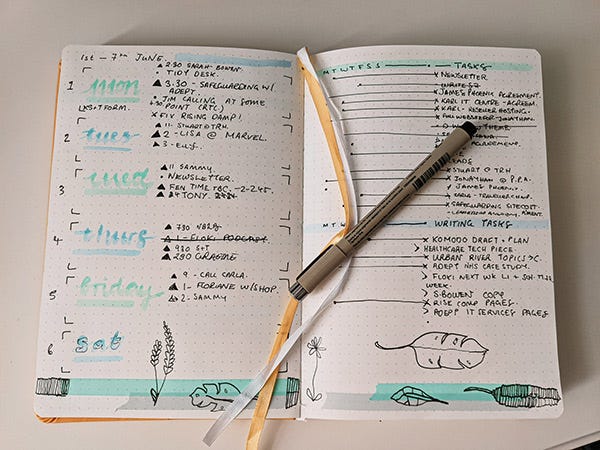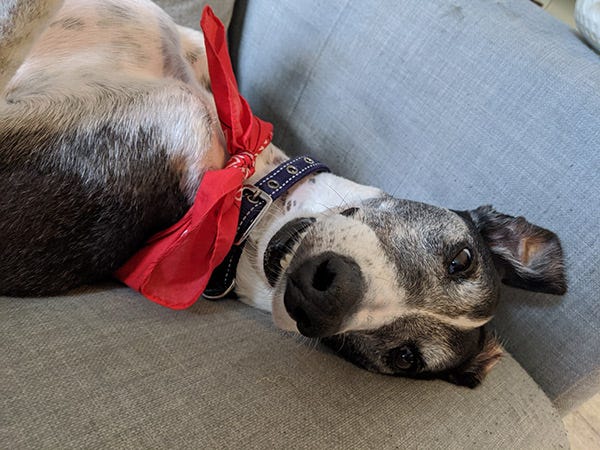Hi, I'm Ellen and I'm a productivity addict ✅
📚 When did I start attaching moral value to getting sh*t done?
Toxic Productivity is the idea of getting as much stuff done as possible, even if those activities are at a detriment to your mental, physical and emotional health.
Hiding behind a shroud of influencer morning routines, the side hustle psyche and aesthetic AF life planners is a much darker truth - and I think it’s getting worse.
I have a complicated relationship with productivity. I don’t think I’m the only person to admit that I am kind of addicted to getting sh*t done. I love bullet journaling and I have dabbled in Trello and Asana, before settling with Notion to keep track of ongoing client projects.

A typical week in my bullet journal
But I am trying to become more self-aware of my compulsive tendencies towards work. If I tick off all my daily tasks before the end of the day there is a high likelihood I will do something from tomorrow’s list, rather than log off and do nothing on the sofa.
Productivity is the enemy of mindfulness: the idea of sitting and doing nothing goes against my urge to do as much stuff as possible. Yet, the need for a little more “nothing” in my life becomes pretty clear by Thursday afternoons, which is usually when I pass out or have a migraine from overworking.
Then Monday comes along and I do it all again.
There is an element of toxic productivity that ties into hustle culture, whereby we’ve stopped doing stuff we enjoy for the sake of it and have started to monetise every little hobby. I am hyperaware of this as I have been asked to quote for a couple of drawing commissions and I am hesitant to turn one of the few things in my life that isn’t touched by the urge to turn it into “work”. Maybe I’ll talk about that more next week.
The idea of toxic productivity isn’t new - it’s been two years since Mark Wahlberg revealed his ridiculous morning routine:

And this sense of “if you work hard enough, you can achieve your dreams” has only intensified since the pandemic hit.
A meritocracy is a societal system whereby people believe that the harder they work, the more they succeed. And when we place such huge personal worth on our ability to do hard work, what happens when we can no longer even leave the house - nevermind complain about having 1,000 unread emails?
At the peak of lockdown, over nine million employees were on furlough. Professionals who previously spent up to 40 hours per week at their workplace were suddenly trapped indoors with nothing to do and nowhere to go. In a society that rebukes people who leave work on time and where “busy-ness” is practically a competitive sport, what happens when the metrics for success are no longer achievable?
If millions of people are sitting at home on their arses, then why are “productivity” search teams peaking since March?

Source: Uber Suggest
My theory is this:
Just because the work is not there, it doesn’t mean that the void is no longer crying out to be filled.
And many of us have worked so hard for so long that we don’t know how to be happy without that sweet, sweet dopamine hit that comes when we tick a task off a list.
This probably explains why DIY, gardening and other “home productivity hacks” have blown up in recent weeks as we clasp at straws to fill that void with just about anything we do - God forbid we sit and do nothing for a full afternoon when that garden fence is just SCREAMING to be painted.
They say the first step towards change is acknowledgement, so this is me publicly acknowledging that I am a productivity addict and I am working on it.
Let me know your thoughts on toxic productivity on Twitter @ContentByTheSea
Further reading on “Toxic Productivity”
Hustle Culture, Workaholism, and Toxic Productivity by Tiffanyferg
Toxic Productivity: You Don’t Need To Be Perfect In A Pandemic by Annabelle Grigg for Oxford Student

If you don’t like fantasy fiction, you can just skip until the boop.
The sun is shining and that means plenty of opportunities to sit in the garden and read. Last week I talked about The Arc of Sythe Trilogy by Neal Schusterman, which was epic and I highly recommend to any fans of Hunger Games, A Handmaid’s Tale and 1984. Over the last week, I finished A Little Hatred by Joe Abercrombie, the latest book in his First Law Universe and first of a new trilogy I believe is called “Age of Madness.” I absolutely loved meeting Abercrombie’s new characters (and surprise appearances from some old favourites), and I can see that the author is putting a lot of time and effort into diversifying the character range - something that the fantasy genre is still seriously lacking.
I also smashed out The Alloy of Law by Brandon Sanderson, the forth in his Mistborn series and, again, the start of a new trilogy. I don’t think anything was going to live up to the first trilogy, but it was an enjoyable and pretty quick read so I will probably revisit for books five and six over the new few months.
I started a couple of new series: Jade City by Fonda Lee, an Asian-inspired fantasy series focuses around the power of jade. This Godfather-esque trilogy is very different from traditional Euro-centric fantasy I’ve read before and I am loving it so far.
And then finally, I started The Black Prism by Brent Weeks, the first in the Lightbringer series that is often very highly reviewed and has been on my list for a while.
What are you reading? Tell me on Twitter or add me as a friend on Goodreads.

Welcome back non-fantasy lovers!
That’s all from me this week, I’ll end with this photo of a very naughty Potter who escaped the back yard on Saturday and took himself on a lovely 2-mile run while our whole village scoured the streets looking for him.

Enjoyed this? Read past issues:
17 June - Grow through what you go through 🌿
10 June - Can you separate the art from the artist?
3 June - Know your worth 💸
27 May - Let's talk about money
20 May - A mental health catch up
13 May - The fantasy characters of lockdown
6 May - The Personal Brand has never been so personal
29 April - When the inspiration runs dry
22 April - One year on…
15 April - It's a great time to be a generalist
8 April - Content creators are performing a national service


